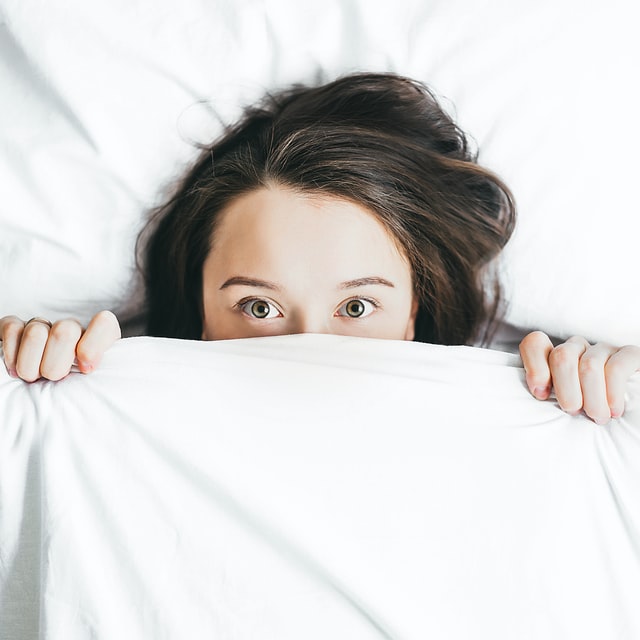This condition occurs when lacrimal glands become inflamed or blocked, and the eyes cannot produce enough tears and keep your eyes lubricated.
This condition can occur at any age, but it is most common in middle or old-aged people. Dry eyes can be of two types temporary dry eyes and chronic dry eyes.
In this article, we are going to discuss possible causes and treatments that why you wake up with dry eyes in the morning, so don’t let your dry eyes ruin your day and keep reading to determine the source of the problem and what you can do to make your dry eyes normal.
What are temporary dry eyes?
This is a mild condition and can be treated easily and more quickly. They occur mostly due to your daily habits and your environment. It may happen if you keep your contacts in for too long and if you have prolonged screen time.
You can resolve them by avoiding dry environments and adjusting your daily habits. You could treat them at home by using different home remedies.
What are chronic dry eyes?
Chronic dry eyes are not easy to resolve, and they may last up for weeks or even months. This occurs due to dry eye syndrome and malfunction of the tear film. The tear film is present at the surface corner of the eye, and it is made up of three layers:
- mucus
2. water
3. oil
To keep the eye’s surface in balance, each of the layers must produce enough moisture. Dry eyes in the morning result if any of the layers reduces its production.
If a malfunction of the water layer occurs, it will result in a lack of tears, and if the oil layer malfunctions, then low-quality tears will be produced.
In case of chronic dry eyes, you need to see a doctor resolve this problem as soon as possible.
What does it feel like to have dry eyes in the morning?
You might need to know all the possible symptoms to get your eyes checked properly. If you notice more than one sign, then maybe it’s time for a trip to the doctor. Your tear film needs to get tested for the imbalance of mucus, oil, and water in your tears. It may be a more significant issue if there’s an imbalance.
You might notice the following symptoms if you have dry eyes in the morning:
- Redness, itching, and burning sensation
- Inability to produce moisture and tears
- A feeling of grit, like something, is inside your eye
- Light sensitivity while using computer or mobile
- Cloudy or blurred vision
- Heavy eyes, red and sore eyelids
- Mucus secretions with stringy consistency
- Problems in night driving
You might have chronic dry eyes if one of these symptoms is an ongoing issue for more than a week.
To find relief from these symptoms, you need to understand the cause to solve this problem.
Causes of dry eyes in the morning
Treating the root cause of the problem will help you solve the problem. Here is the list of the possible cause of dry eyes, find out if any on them applies to you:
Environmental factors
Your eyes are greatly affected by the environment and your behavior. Take an example of eye makeup; when you sleep with eye makeup on, its particles enter your eyes, and it will affect your tear film.
The oil present in your eyes will become thin due to these particles. To reduce symptoms, avoid sleeping with makeup on. Eyes become dry when water evaporates quickly due to a smoky, windy, or dry atmosphere. Low blinking rate caused by looking at the screen for a long time or performing any task also causes drying eyes. Taking breaks can help prevent the drying of the eyes.
Dry eyes in the morning can also result from wearing contacts for too long during the day. Tear film over the cornea can become thin due to long-term use.
If your environment is described as any of the above factors, then you need to change them and check whether the issue of dry eyes has been resolved or not.
Medications
Medications affect the sinuses and mucus membranes, resulting in the reduced production of tears leading to dry eyes. These medications include:
Antihistamines
- Diuretics and beta-blockers that prevent high blood pressure
- Antidepressants that reduces anxiety
- Sleeping pills
If you are taking these medications and making your eyes itchy, dry, and painful, you need to consult your doctor and ask for alternative medicines.
For increasing your tear production, the doctor will consider the following possibilities during treatment:
- Relieve from inflammation
- Trigger the production of tears
- Balance tear film and maintaining tears
Artificial tears, omega 3-fatty acids, and eye drops prescribed by the doctor can help prevent dry eyes in the morning.
Nocturnal lagophthalmos
This is the condition in which some people sleep with their eyes partially open. It results because of the inability of eyelids to close while sleeping altogether.
This condition is the facial nerve’s weakness, which may occur due to trauma of the skull and jaw and any injury to the cerebellar artery.
The chances of entry of the dust or any other foreign particles into your eyes increases if you sleep with open eyes resulting in irritating and dry eyes in the morning
Menopause
Among 16 million Americans, more women have dry eyes issue than men. Several reasons make women more susceptible to dry eyes:
1. Hormonal fluctuation and imbalance can cause eyes to dry out.
2. These fluctuations can occur in women during pregnancy or if taking birth control pills.
3. Menopause also causes hormonal changes, due to which some women wake up with dry eyes in the morning.
The hormone stimulates the production of tears, so tears’ production is reduced due to hormonal imbalance.
Autoimmune disease
Diseases such as diabetes, arthritis, lupus can cause you to wake up with dry eyes in the morning. Poor tear production results from these diseases. They may lead to the symptoms of fever, fatigue, and joint pain.
To improve dry eye, you need to diagnose and get proper treatment of the underlying autoimmune disease.
Aging
Dry eyes can develop at any age. But this condition becomes more common as you get older because the production of tears is declined in old age resulting in reduced lubrication and dry eyes.
Tear production cannot be repaired, but you can talk to your doctor about the use of artificial tears, which can help in providing extra lubrication if used daily.
Get the treatment according to your symptoms. This will help you relieve the dryness that you have to face every day.
Blepharitis
This condition affects the eyelids. It mostly occurs due to bacterial infections and irritants.
Inflammation and clogging of oil glands present on the base of eyelashes occur, making your eyes dry, itchy, and swollen. You can feel the discharge of oily flakes around your eyelashes when you wake up.
To reduce the inflammation, use artificial tears, antibiotics, eye scrub, and warm compress over your eyelids.
Allergies
Allergies due to substances such as dust, pollen, and any other chemical substances also cause you to wake up with dry eyes in the morning. You will feel itching, grittiness, and dryness along with a burning sensation.
Allergic reactions can occur if any irritant and dust particles are present and you sleep without washing your eyes at night.
Oral antihistamines and over-the-counter allergy medications are used to treat these conditions.
What should you do about waking up with dry eyes in the morning?
First of all, you need to find out the root cause and then reach your doctor for proper treatment. Your doctor might suggest you following treatments:
Temporary punctual occlusions
your doctor will stop the tear that drains from your eye by closing the duct or punctum by using the procedure of plugging and blocking.
Artificial tear drops and ointments
Artificial tear drops act as a mini moisture chamber for your eyes. This is the most common treatment recommended by doctors to keep your eyes lubricated. A thick heavy ointment is recommended to use at night while sleeping.
Lipiflow
Your doctor may suggest a thermal pulsation system that uses heat and pressure to remove the blockage of glands that are present on your eyelid. These glands produce oil in your tears and keep your eyes wet and applying heat and massage can prevent tears from evaporating.
Anti-inflammatory drugs
Drugs such as corticosteroids and cyclosporine reduce the inflammation of oil-secreting glands and the surface of the eye cornea. Antibiotics such as pilocarpine or cevimeline are also recommended to stimulate tear production.
Testosterone cream
Oil glands may not produce oil due to a lack of testosterone and make your eyes dry. Many doctors recommend testosterone cream for better working of oil glands. You can apply it daily on your eyelids as prescribed by the doctor.
Other medications that your doctor may recommend includes:
- Eye inserts to release lubricating tears. They are placed between the eyeball and lower eyelid.
- To trap moisture and prevent dry eyes in the morning, special contacts are prescribed that cover more of the eyeball.
- Eye drops made from a person’s blood serum known as blood-based eyedrops are sometimes recommended. they have healing and nurturing properties.
Dry eyes in the morning: home care and remedies
Treatments that you can try at home include the following:
Proper diet
Dry eyes may be the indication to protect your eyes by adopting a healthy lifestyle. So, here is what you can do to improve your eye health.
Drink water
You need to keep yourself hydrated to prevent your eyes from drying. Your eyes can become dehydrated if you don’t drink enough water so it is necessary to drink 1.5 liters of water each day.
Fruit
Vitamin-C and antioxidants are very important for your eye health. Deficiency of vitamin C often leads to dry eyes. Fruits are a good source of antioxidants and vitamins so you can easily prevent dry eyes by just incorporating fruits high in vitamin C into your daily diet.
Fatty acids
Our body is not able to produce fatty oils which are useful for the proper working of oil glands. You need to consume food high in omega 3- fatty acids, this will help ease symptoms of dry eyes. Chia seed, fish, salmon, soybean, and flaxseed oil are high in omega 3-fatty acids.
Washing eyelids
Before going to sleep and after waking up always wash your eyelids with warm water to reduce inflammation of the eyelid.
Warm compressor
Use wet and warm clothes and press them gently over your eyes for five to ten minutes. This will help in unclogging the oil glands of your eye.
Lifestyle changes
- Wear sunglasses when you stay for too long outside in then.
- Use a humidifier for the purification of indoor air, it will protect your eyes from drying.
- Blinking more while doing a long task and long time usage of screen.
- Change the direction of the vents, air conditioners, or heaters if they are directing toward your face while sleeping.
- Use an eye mask while sleeping.
So, to sum up
Waking up with dry eyes in the morning can be annoying and frustrating. for some people, it can be cloudy and blurred vision and for some, it may cause gritty or itchy feelings.
Find out the cause and symptoms of the condition and get the treatment according to that. If it is temporary then you can get it resolved at home by adopting a better lifestyle but if it continues for weeks or months then you are in a need to see a doctor and find a better solution.




